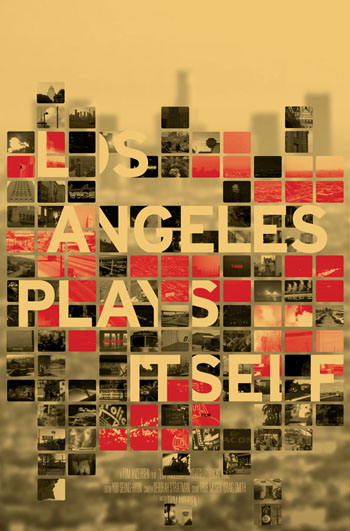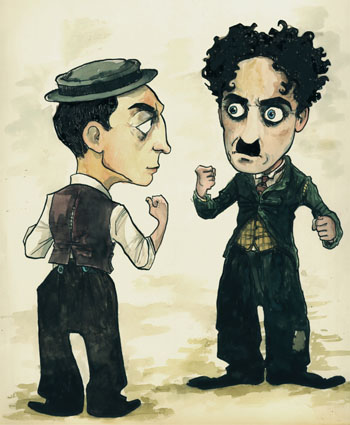Before the showdowns, we catch up with the tail-end of a week-long screening in New York. “The video essay has become an increasingly popular critical approach in the past decade, but we’re still catching up with Los Angeles Plays Itself,” writes Nick Pinkerton for Artforum. “Thom Andersen’s ‘city symphony in reverse’—an essay movie clocking in at just under three hours—first appeared in 2003, when the CalArts professor and filmmaker was sixty years old.” The new 2013 “re-edit” screens at the IFC Center two more days and this coming Sunday in Berlin as part of the ongoing (and excellent!) Unknown Pleasures series. Pinkerton:
Andersen has disdain to spare, and few idols of the Los Angeles pantheon are left untoppled. He slags the diminutive acronym “LA” and brushes aside “The mystical blatherings of Joan Didion and company about the automobile and the freeways.” The word “masterpiece” occurs only twice in Andersen’s text—and not in the expected contexts, but in reference to Fred Halsted’s 1972 gay porn epic L.A. Plays Itself, from which Andersen adapted his title, and 1974’s Gone in 60 Seconds, with its materialist cinema of “conspicuous destruction.” “Condescension” occurs several times, however, and Andersen is constantly on the lookout for it. For Andersen this is the cardinal sin, the sin of movies that despise the city in which they are made without even knowing it. By debunking the claims of industrial moviemaking and “their betrayal of their native city,” Andersen is in effect defending Los Angeles from “Hollywood”—not a physical place like Los Angeles, but “a metonym for the motion picture industry.” Andersen is arguing for his own Los Angeles cinema, opposing geographic and historical license with Neorealism, opposing a commuter cinema that drives through with a pedestrian cinema that lingers.
Martha Schwendender for the Times: “The interest in film among younger artists has also brought renewed attention to experimental filmmakers from the 1960s and ’70s, several of whom appear in Images of an Infinite Film, a small, slightly disjointed show at the Museum of Modern Art. Chief among them is Hollis Frampton, a writer, theorist and filmmaker whose notion of the ‘infinite film’ as an ‘endless ribbon’ of images and a metaphor for human consciousness provided the exhibition’s title.” On view through March 2.
“The cinema’s conquest of the twentieth century finds its exemplary symbol in the character that made Charlie Chaplin famous, the Little Tramp,” writes Richard Brody in the New Yorker. “Chaplin came up with the costume and the mannerisms in February, 1914, just a few weeks into his movie career; Film Forum celebrates the centenary with a weeklong series, The Tramp 100,” on through tomorrow. In a followup blog entry, Brody argues that Chaplin’s talking pictures “rival—and even surpass—his silent work.” At the L, Aaron Cutler recommends catching Kevin Brownlow and David Gill‘s Unknown Chaplin (1983), screening tomorrow at 8:15 pm.
London. “A selection of 30 Buster Keaton feature films and shorts, accompanying talks and introductions is to run at the BFI Southbank for the next few weeks, 119 years after the actor’s birth and 14 years after the institute’s last major season,” writes Antonia Quirke in the Financial Times. “Why now? ‘We don’t need an excuse,’ says curator Geoff Andrew. ‘He is one of the great masters of cinema. Not just as an entertainer but as a film-maker, and his work remains modern in a way that so many films of that period do not.'” More from Nicholas Barber in the Independent: “As Kevin Brownlow writes in his history of the silent era, The Parade’s Gone By, ‘Buster Keaton was probably the best comedy director in the business. Chaplin’s use of film was pedestrian by comparison.'” A Serious Man, a Modern World: Buster Keaton and the Cinema of Today is on through February 26.
Pedro Costa‘s free masterclass is happening today, tomorrow, and Wednesday at the Birkbeck Cinema; on Thursday, Costa will be at the ICA for a Q&A following a screening of his 2001 study of Jean-Marie Straub and Danièle Huillet at work, Where Does Your Hidden Smile Lie?
“Potential for brutality and violence is immediately clear in La Belle et la Bête, a sly and dark spin on the classic story of a cursed Beast (Jean Marsais) who becomes even more tormented after forcing a lovely damsel to hold up in his fantastical abode,” writes Glenn Heath Jr. for Little White Lies. Geoffrey Macnab for the Independent: “Cocteau’s 1946 version of the famous fairytale (re-released in a 4K restoration as part of the British Film Institute’s ongoing Gothic season) is a tour de force that belies the straitened circumstances in which it was made. Shooting not long after the German occupation ended, Cocteau and his collaborators conjure up visual effects that are as startling and as magical as anything achieved in huge-budget Hollywood films.” In the Observer, Xan Brooks notes that this is “a film that does not look so much imported from the 1940s as blown in from another world,” and the Guardian‘s Peter Bradshaw adds that “it is almost as if Cocteau’s camera has miraculously recorded a dream.” Screens through January 30.
Austin. The Film Society’s Godard vs. Truffaut series runs through February 23 and, in the Chronicle, Marc Savlov argues the case for Team Godard, while Kimberley Jones takes up the case for Team Truffaut.
Palm Springs. The festival‘s on through next Monday, and Michael Guillén previews a selection of Spanish- and Portuguese-language titles while Kristopher Tapley reports on the awards gala.
For news and tips throughout the day every day, follow @KeyframeDaily on Twitter and/or the RSS feed. Get Keyframe Daily in your inbox by signing in at fandor.com/daily.





